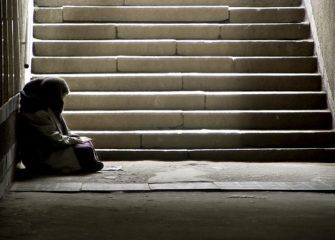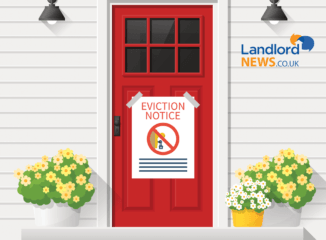227,000 families and individuals across Britain are experiencing the worst forms of homelessness, new research from homelessness charity Crisis reveals today.
This includes people sleeping on the streets, stuck in insecure accommodation like B&Bs, or forced to sleep in cars and sheds.
The research, led by Heriot Watt University, shows 227,000 households on any given night are without a home to call their own. Most of these households are in England, not just because of the larger population, but also because there are higher levels of homelessness than in Scotland and Wales.
0.86% of all households in England are experiencing homelessness on any given night, compared with 0.69% in Wales and 0.57% in Scotland. These different rates of core homelessness across the three nations are due to the different housing and homelessness policies in place. For example, Crisis points out that in Scotland rates are lower than in England due to factors such as a better supply of social housing and more inclusive access homelessness services.
Some of the more common forms of homelessness include those living in unsuitable temporary accommodation such as B&Bs for extended periods of time. Nearly 25,000 families and individuals are living this way, including 22,600 households across England alone. Levels are rapidly increasing, as the number of households experiencing this form of homelessness in England is three times what it was in 2012.
Although homelessness levels are already high, they are predicted to rise in the immediate future and even more over the next 20 years if the right action isn’t taken to address it. Around 350,000 households in Britain are predicted to experience homelessness by 2041, of which over 320,000 will be in England.
These new figures include the period the Westminster Government introduced the Everyone In scheme last year in response to the pandemic. This provided emergency accommodation for people sleeping rough and showed what can be achieved through direct action and support, to help people out of homelessness. Similar initiatives to provide emergency accommodation were also launched by the governments in Scotland and Wales where this support, such as providing self-contained accommodation in Wales, is ongoing.
However, a cut to Universal Credit, a freeze to housing benefit and a lifting of the ban on evictions in 2021 have pushed more people into homelessness. Rising COVID-19 cases are putting more people at risk as the impact of the pandemic continues. Earlier this week, the Westminster Government announced £28 million to provide funding for emergency accommodation for people who are homeless and to encourage vaccination. But Crisis highlights how having a home to call your own is crucial to protect people’s health, and its research shows thousands of people are without this security. Other factors, like the insecurity of jobs in the hardest hit sectors, are putting further pressure on people.
This research comes today as Crisis opens their Christmas services for the 50th year, supporting people facing homelessness over the festive period and introducing them to the support Crisis can offer year-round to help them leave it behind for good.
This Christmas, Crisis will be opening hubs across London to provide services for people experiencing homelessness and have also booked hotels to provide shelter and warmth for people who would otherwise be sleeping rough. Through their 11 Crisis Skylights across England, Scotland and Wales, volunteers will be providing services during the festive period including Christmas Day dinners, nature walks, information and guidance, health support and a telephone befriending service.
When David, 57, became homeless, he spent time living in a hotel, before moving between hostels and shelters. He was told about Crisis at Christmas in 2019, and the ongoing support he received led him to securing a job and somewhere to live.
Talking about his experience, David said: “It was stressful being in the shelter because you go there at night, you eat, you sleep, you wake up. You cannot take your bath – I maybe could have a bath once a week. You then have to go to the next shelter, it’s not just in one place.
“I first heard about Crisis when I was at a night shelter in December 2019. They took a group of us to Croydon for Christmas. We were lodged there, fed well. We had so many opportunities; we had computer access, recreational games. It was fantastic. We had the option to ask for clothes, so I got some new clothes. I could access a washing machine, showers. Crisis has made a fantastic difference to me. They have supported me immensely. Without Crisis, life would have been so difficult.”
Jon Sparkes, Chief Executive of Crisis, said: “No-one should be without a place to call home now or at any time of year. It is utterly devastating that throughout Britain thousands of people are facing a Christmas on the streets, trying to shelter in places like a car or stuck living in one room in a B&B with no proper cooking or washing facilities. It shouldn’t have to be like this.
“For the last 50 years at Crisis at Christmas we’ve opened our doors to people at one of the most difficult times of the year, providing respite from the hardships of homelessness. More importantly, we’ve introduced thousands of people to our year-round support to help them leave homelessness behind for good. We don’t want to have to be here in another 50 years.
“These predictions for rising homelessness levels are stark, but with the right government action to end homelessness for all, we can make sure they don’t become a reality. Last year, we saw the difference government action made, helping people off the streets and into emergency accommodation. We need to see all governments act to make sure everyone has a safe and secure home and to help people avoid homelessness before it happens.
“Until homelessness is ended for good though, Crisis will continue to be here at Christmas and all year round providing vital support to the individuals who need us.”
You can learn more about how to support Crisis this Christmas on its website: www.crisis.org.uk/support



